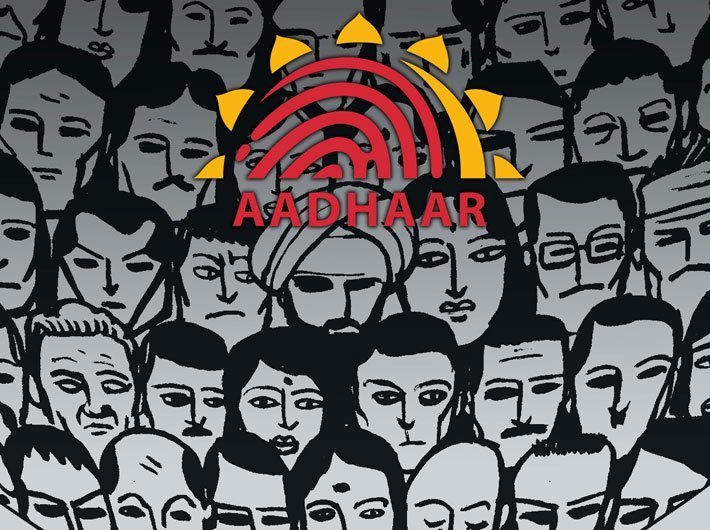Lok Sabha speaker said that the proposal to amend the Income Tax Act in the Finance Bill, 2017 by labelling it a ‘Money Bill’ is permissible under Rule 219 of the Rules of Business and Procedure
The media reported very disturbing news on Tuesday. The government is seeking to amend the Income Tax Act, 1961 and to make it compulsory for taxpayers to have an Aadhaar card for filing income tax (IT) returns. If the Aadhaar number or the Aadhaar enrolment number is not provided by a taxpayer at the time of filing IT returns, after July 1, 2017, the permanent account number (PAN) will be treated as invalid.
The proposed move goes completely against what is said in the Aadhaar Act, 2016. That law is meant for subsidies and payments made out of the Consolidated Fund of India. The income tax that we taxpayers pay is credited to the Consolidated Fund of India.
So while the Aadhaar Act makes Aadhaar registration for several matters mandatory by justifying that it is an “entitlement for the registered person” (though it cannot be used as proof of citizenship), other laws are being amended to make Aadhaar compulsory for matters not covered by the Aadhaar Act. This is a gross violation of the assurances that the central government is giving the supreme court on the pending PIL cases against the constitutional validity of Aadhaar. I hope the petitioners will enlarge the scope of the petition to challenge not just the Aadhaar Act but the concept, practice and the very discourse of Aadhaar.
All money bills are financial bills but all bills relating to financial matters are not 'money bills'
On Tuesday, when an MP raised a point of order to the tabling of the proposal to amend the Income Tax Act in the Finance Bill, 2017 by labelling it a ‘Money Bill’, the speaker said that under Rule 219 of the Rules of Business and Procedure, this is permissible.
In 2008, I researched extensively in relation to a Bill to amend the 2004 Right to Information Act in J&K which the then state government pushed through the state legislature as a 'Money Bill'. When I, along with other civil society partners, raised this constitutional impropriety publicly, the governor did not give his assent to the Bill but the deputy chief minister seemed to have convinced him to sign by claiming that the governor could not refuse assent to a Money Bill.
I strongly believe that all 'Money Bills' are financial bills but all financial bills are not, cannot and must not be labelled 'Money Bills'. Money Bills are only a subset of the larger category of financial bills. To treat all financial bills as Money Bills would be a blatant violation of the privilege of the upper house to do its sacred duty of tempering the majoritarian enthusiasm of the lower house. Our legal opinion sent to the governor of J&K in 2008 has core arguments explained below.
Article 110 of the constitution defines a Money Bill as follows:
Definition of Money Bills: (1) For the purposes of this Chapter, a Bill shall be deemed to be a Money Bill if it contains only provisions dealing with all or any of the following matters, namely:-
(a) the imposition, abolition, remission, alteration or regulation of any tax;
(b) the regulation of the borrowing of money or the giving of any guarantee by the Government of India, or the amendment of the law with respect to any financial obligations undertaken or to be undertaken by the Government of India;
(c) the custody of the Consolidated Fund or the Contingency Fund of India, the payment of moneys into or the withdrawal of moneys from any such Fund;
(d) the appropriation of moneys out of the Consolidated Fund of India;
(e) the declaring of any expenditure to be expenditure charged on the Consolidated Fund of India or the increasing of the amount of any such expenditure;
(f) the receipt of money on account of the Consolidated Fund of India or the public account of India or the custody or issue of such money or the audit of the accounts of the Union or of a State; or
(g) any matter incidental to any of the matters specified in sub-clauses (a) to (f).
(2) A Bill shall not be deemed to be a Money Bill by reason only that it provides for the imposition of fines or other pecuniary penalties, or for the demand or payment of fees for licences or fees for services rendered, or by reason that it provides for the imposition, abolition, remission, alteration or regulation of any tax by any local authority or body for local purposes.
(3) If any question arises whether a Bill is a Money Bill or not, the decision of the Speaker of the House of the People thereon shall be final.
(4) There shall be endorsed on every Money Bill when it is transmitted to the Council of States under article 109, and when it is presented to the President for assent under article 111, the certificate of the Speaker of the House of the People signed by him that it is a Money Bill.
So, if the amendments proposed to the Finance Bill 2017 provide for the invalidation of a PAN number simply because Aadhaar number was not quoted by the taxpayer while filing the IT returns, then a taxpayer will not be able to file it. This could lead to penal action and imposition of penalties under the Income Tax Act. Therefore, there is a Constitutional bar on certifying a bill containing extraneous financial matters as a 'Money Bill'. The Rajya Sabha is not empowered to vote on a "Money Bill". It can only debate its contents.
Rule 219 of the Lok Sabha's rules of Procedure and Conduct of Business explains a ‘Finance Bill’ in the following terms:
219 (1) In this rule “Finance Bill” means the Bill ordinarily introduced in each year to give effect to the financial proposals of the Government of India for the next following financial year and includes a Bill to give effect to supplementary financial proposals for any period."
However, Rule 219 does not make a reference to 'other financial bills' which are not 'Money Bills'.
Article 107 of the Constitution clearly indicates that there could be "financial bills" other than Money Bills.
107. (1) Subject to the provisions of articles 109 and 117 with respect to Money Bills and other financial Bills, a Bill may originate in either House of Parliament."
Article 117(3) makes the leave of the President mandatory for the tabling of Bills involving expenditure from the Consolidated Fund of India, in Parliament:
"(3) A Bill which, if enacted and brought into operation, would involve expenditure from the Consolidated Fund of India shall not be passed by either House of Parliament unless the President has recommended to that House the consideration of the Bill."
"Other financial Bills" could relate to matters that require payments to be made out of the Consolidated Fund of India. Such bills can be introduced in Parliament through either House, unlike a Money Bill which must be introduced through the Lok Sabha only. Under Article 117 of the Constitution, both Money Bills and other financial bills require the leave of the president to be tabled in the Parliament. So, the Right to Information Bill was a financial Bill that was tabled with the leave of the president because it involved the creation of a Central Information Commission that would have to be financed out of the Consolidated Fund of India. But the RTI Bill was not a "Money Bill" because it did not match any of the criteria provided in Article 110 of the Constitution.
So by conflating the category "Finance Bill" (which is the title of Rule 219) with the category of "other financial Bills" if the speaker certifies the Finance Bill, 2017 as a 'Money Bill', when the proposed amendments adopted by the Lok Sabha are transmitted to the Rajya Sabha, and later on to the president for his assent, that would be a grave constitutional impropriety.
Therefore the explanation given by the speaker on Tuesday about certifying the Finance Bill, 2017 which contains proposals to amend several other laws and the currently proposed amendments to the Income Tax Act, as a 'Money Bill', is unreasonable and untenable, given the crystal clear language of Articles 107, 109 and 110 of the Constitution and Rule 219 of the Lok Sabha Rules of Business and Procedure.
Some petitioners have already challenged the 'mis-certification' of the Aadhaar Act as a 'Money Bill’ when it was tabled in the Parliament. This latest move should also be challenged as unconstitutional. The speaker's act of labelling such Bills as ‘Money Bills’ should not be given immunity from challenge in courts as they violate the Constitution itself. The supreme court must step in to guard and protect the Constitution and the privilege of the Rajya Sabha to discuss and vote on "other financial bills".



